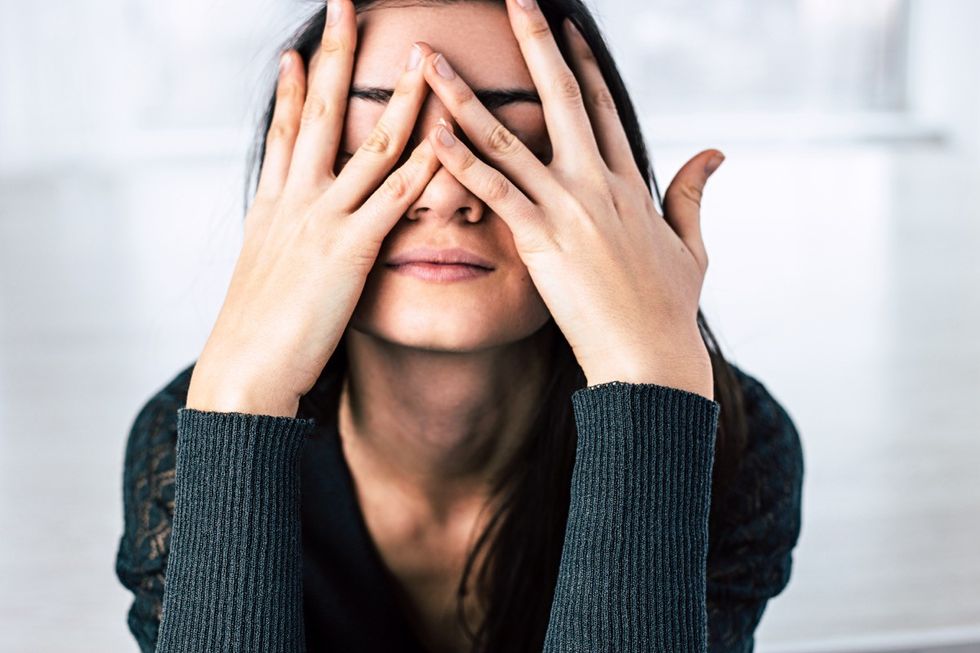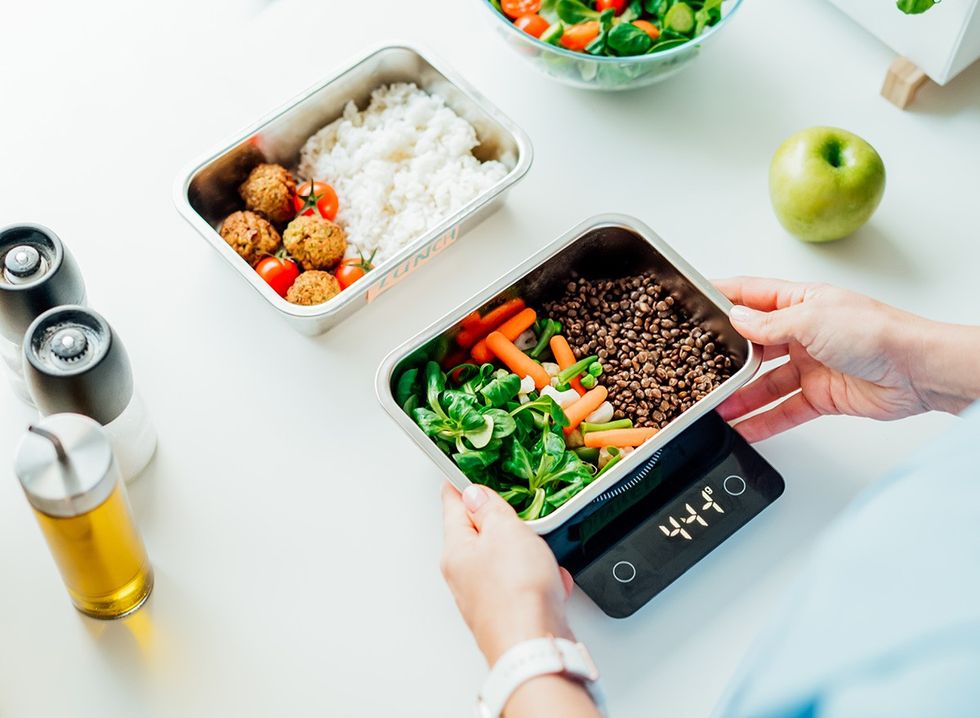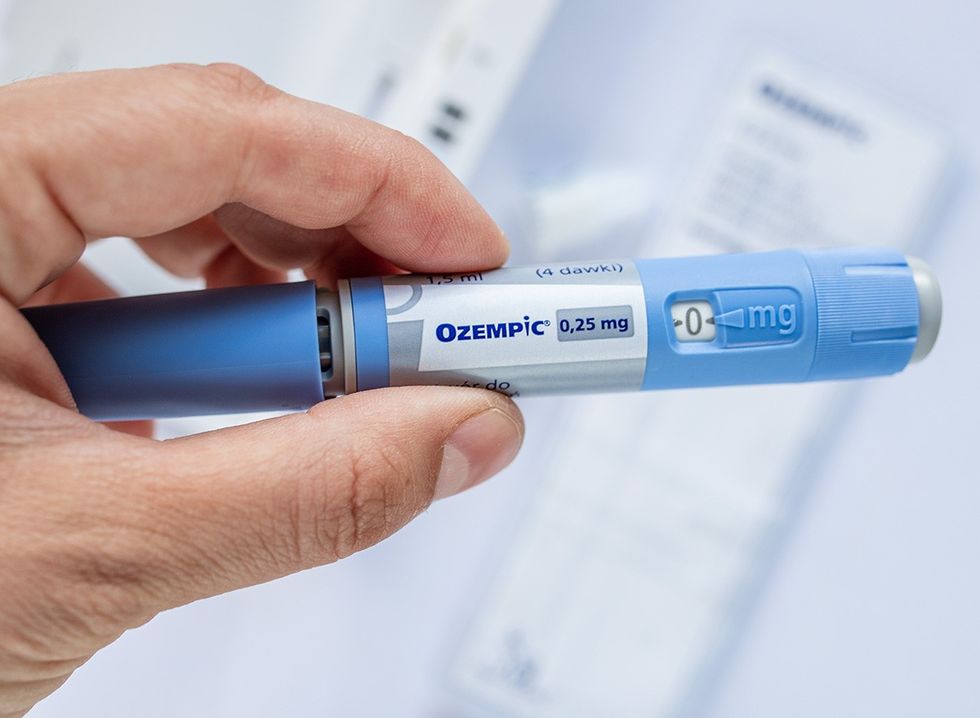As an expert in weight loss and hormones, I have spent the last four years helping thousands of women balance hormones and lose weight as they go through perimenopause and menopause. I have 20 years of experience in traditional medicine, additional training in functional medicine, additional certifications in lifestyle medicine, and health and wellness coaching. But more importantly, I have dedicated my entire practice to helping women navigate these changes because this is the most underserved time in a woman's health journey and makes a huge impact on the way they feel and age.
There are five main hormonal imbalances that impact women as they go through perimenopause that directly impact their ability to lose weight. Many of my patients are frustrated because the things that they did in their 20s and 30s no longer work to allow them to control the scale after the age of 35. This is very disheartening, and so by understanding hormone balance, what's happening in your body, and ways to address and heal the root cause, women are empowered to control the scale at any age.
Here are the 5 Hormone Imbalances, the symptoms, and some treatments for each:
1. Adrenal Fatigue Caused by Chronic Stress and a High Demand Lifestyle
 Copyright Sarah A. Gibson
Copyright Sarah A. Gibson
- Low energy/fatigue
- Mid-afternoon crash
- Difficulty falling asleep at night
- Difficulty staying asleep/3 am waking with mind racing and can't fall back asleep
- Brain fog: difficulty with concentration, memory, recall
- Excess weight around the middle
- Difficulty losing weight
- Feeling anxious or irritable.
Treatment: With adrenal fatigue people can feel chronically stressed. Some of the things you can do yourself to help with this imbalance is to focus on stress management techniques like meditation, yoga, walks in nature and to work on regulating your sleep.
2. Sex Hormone Imbalance
 Shutterstock
Shutterstock
Estrogen Dominance
- Mood issues: anxiety, irritability
- Heavy periods
- Clotting with menstrual bleeding
- Dense breast tissue
- Mood swings
- Fatigue
- Difficulty falling asleep and staying asleep.
Low sex hormones
- Hot flashes
- Night sweats
- Low libido
- Difficulty climaxing
- Low muscle mass.
Treatment: You should talk to your medical provider to see if HRT is needed and right for you, but stress and adrenal fatigue will deplete progesterone supplies, so just managing these will naturally increase your progesterone levels, which is the calming hormone and will allow your sex hormones to balance out a little.
3. Vitamin D Deficiency
 Shutterstock
Shutterstock
- Low energy
- Mood disturbance: depression, anxiety
- Inflammation
- Brain fog
- Hormone imbalance
- Difficulty maintaining a healthy weight
- Higher risk for cardiovascular disease and osteoporosis.
Treatment: Patients should get labs done to check their vitamin D levels. You want your levels to be between 60 and 80. If they're not, a vitamin D supplement can help, although sometimes a prescription is needed to increase your serum level. Meanwhile, make sure you are getting enough sunlight, which will increase your vitamin D levels.
4. Thyroid Dysfunction
 Copyright Sarah A. Gibson
Copyright Sarah A. Gibson
- Thermodysregulation (feeling cold or hot all of the time)
- Brittle hair and nails
- Dry skin
- Fatigue
- Low energy
- Heart palpitations
- Anxiety
- Excessive sweating
- Difficulty sleeping.
Treatment: Thyroid dysfunction can often be a methylation issue, so make sure to talk to a doctor and get labs done. But one thing you can do is include more selenium in your diet. One example of this would be eating two Brazil nuts daily to provide selenium that will support thyroid health. I also often recommend methylated B vitamins as an additional supplement.
5. Insulin Resistance
 Shutterstock
Shutterstock
- Abdominal fat
- Fatigue/low energy
- Slow metabolism (can't lose weight even if you starve yourself)
- Gain weight very easily
- Can lead to prediabetes and diabetes.
Treatment: Again, make sure to talk to your doctor but along with that, what you eat can make a difference.
Eating fiber and protein to stabilize your blood sugar is going to be your top lifestyle hack here.
Focus on eating 4 to 5 smaller meals per day spaced about three hours apart, focusing on 20 to 30 g of protein each time you eat and adding in 5 to 10 g of fiber each time you eat as well. This will stabilize blood sugar which will help to reverse insulin resistance.
The Impact of Stress
 Shutterstock
Shutterstock
Every high-functioning female deals with stress on a constant basis. The problem is that stress was meant to be just a short-term response! And when we are younger, we can handle the chronic demand for additional cortisol. However, as we begin to go through perimenopause, our bodies become more sensitive. Our adrenal glands can't keep up with the high demand, and we start to experience symptoms like worsening anxiety, brain fog, and irritability. The reason for this is that the adrenal gland has to produce more than just cortisol; when it gets fatigued, we end up hormonal imbalances.
You Can Transform Your Health and Thrive
 Shutterstock
Shutterstock
I have many high-functioning women who are clients and don't understand why they are suddenly struggling with symptoms since their lifestyle has always been high-stress. My client, LaTonya, was a busy mom with two teenage twins, had gotten her PhD, and was the CEO of a busy company. She had been working with a personal trainer doing intense workouts for eight months prior to working with me. We diagnosed her hormone imbalances, switched her daily routine, added in medications and supplements to heal her body, and focused on hitting her nutrition goals. In just six months, she was down over 50 pounds and thriving in her busy schedule.
I have thousands of stories of women who have gotten transformational results. Every single day, our team celebrates these wins and highlights the impact that we've had on women's lives.
Nutrition Strategies for Hormone Balance
 Shutterstock
Shutterstock
At our practice, we teach "food freedom," where no foods are off-limits. Instead, we help clients focus on hitting protein and fiber goals to fill in dietary gaps.
Fiber-rich foods
Vegetables and whole grains contain fiber, which balances blood sugar, controls hunger hormones, and even promotes healthy estrogen levels.
Examples of fiber-rich foods include:
Whole Grains: Oats, brown rice, and quinoa aid digestion and provide sustained energy.
Fruits: Apples (with skin), berries (raspberries, blackberries, strawberries), and pears improve digestion and offer antioxidants.
Vegetables: Broccoli, Brussels sprouts, and carrots enhance digestion and provide essential nutrients.
Legumes: Lentils, chickpeas, and black beans are high in fiber and protein.
Nuts and Seeds: Chia seeds, flaxseeds, and almonds are packed with fiber and healthy fats.
Protein-Rich Foods
Protein is broken down into amino acids, which are the building blocks for so many things our bodies need, including making brain chemicals (neurotransmitters), building hormones, and repairing lean muscle.
Examples of Protein-Rich Foods Include:
Animal Sources: Chicken breast, salmon, and eggs are high in protein and essential amino acids.
Dairy: Greek yogurt, cottage cheese, and milk offer balanced protein and calcium.
Legumes: Lentils, chickpeas, and black beans provide protein and fiber, ideal for vegetarian diets.
Nuts and Seeds: Almonds, pumpkin seeds, and peanuts are rich in protein and healthy fats.
Soy Products: Tofu, tempeh, and edamame are versatile, protein-rich plant-based options.
Food rich in Vitamin D
Vitamin D is essential for so many functions in our body, yet most of us are deficient in it! Vitamin D helps regulate healthy weight, decrease inflammation, stabilize mood, prevent osteoporosis, and protect against cardiovascular disease.
Examples of Foods rich in Vitamin D Include:
Fatty Fish: Salmon, mackerel, and sardines are excellent sources of vitamin D
Fortified Foods: Fortified milk, orange juice, and cereals help meet daily vitamin D needs.
Egg Yolks: Eggs provide a modest amount of vitamin D and essential nutrients.
Mushrooms: Some varieties, like shiitake and maitake, contain vitamin D, especially when exposed to sunlight.
Omega-3 Fatty Acids
Omega 3 fatty acids help reduce inflammation and improve both brain health and heart health.
Examples of Omega-3 Fatty Acid-Rich Foods Include:
Fatty Fish: Salmon, mackerel, and sardines are excellent sources of omega-3s and provide high-quality protein.
Chia Seeds: Packed with omega-3s, they can be easily added to smoothies, yogurt, or oatmeal.
Flaxseeds: High in omega-3s, they can be ground and incorporated into various dishes, such as baked goods or cereals.
Walnuts: A convenient snack option, rich in omega-3s and beneficial fats.
Hydration
Staying well-hydrated helps manage symptoms like bloating and dryness.
Tips for Staying Hydrated Include:
Water: Aim to drink at least 8 glasses (64 ounces) of water daily. Carry a reusable water bottle to ensure you're drinking throughout the day.
Hydrating Foods: Incorporate water-rich foods into your diet, such as cucumbers, watermelon, oranges, and strawberries, which can contribute to overall hydration.
Herbal Teas: Herbal teas like chamomile or peppermint can be a soothing way to increase fluid intake without caffeine, which can sometimes exacerbate dehydration.
Limit Dehydrating Beverages: Reduce consumption of caffeinated and alcoholic beverages, as they can lead to dehydration. If you do consume them, balance them with additional water intake.
RELATED: This Plan Is How to Lose 5 Percent Body Fat In 2 Weeks
Exercise Strategies for Hormone Balance
 Shutterstock
Shutterstock
Strengthen your muscles
As women age and hormone levels change, we lose lean muscle (which is called sarcopenia). This causes our metabolism to slow down because muscle burns almost twice as many calories as fat does, so when we lose muscle mass, we burn fewer calories.
Another reason this is so important is that we are at risk for changes in balance and mobility as we age (as a woman, you don't want to be the one who has "fallen and can't get up!")
A simple way to combat this is to incorporate lifting weights for 20 minutes 3 times per week. And if you are just starting out, you can do this right in your living room by using exercises like squats, push ups, and overhead press. This protects lean muscle and can prevent that loss of muscle.
Move your body
Just as it is important to strengthen your muscles, it is important to move your body. As we age, our activity level can decrease, which causes weight gain. Therefore, by focusing on daily movements, we continue to burn calories the same way we did when we were younger!
Easy strategies include:
- Trying to hit step goals! You can track daily steps and slowly increase over time to get to a goal of 10,000 steps daily.
- Incorporate flexibility movements that also build lean muscle, like yoga and Pilates.
- Even just developing a simple daily stretching routine can help your balance and mobility as you age.
- Focus on simple habits.
As we age, our bodies become more sensitive to daily fluctuations. For example, you may notice that it is more difficult to recover from a night of terrible sleep. By focusing on simple habits and staying consistent, you can develop a pattern that sets your body up for success.
Exercise plays a critical role in managing menopause symptoms by:
Reducing Hot Flashes: Regular aerobic exercise can help lower the frequency and severity of hot flashes.
Improving Mood: Exercise boosts endorphin levels, helping to manage mood swings and anxiety.
Enhancing Sleep Quality: Physical activity promotes better sleep patterns.
Maintaining Bone Density: Weight-bearing exercises like walking and strength training prevent bone loss.
Supporting Weight Management: Regular physical activity helps in maintaining a healthy weight, reducing the risk of associated health issues.
RELATED:12-3-30 Walking Method: 20 Proven Tips to Lose Weight Faster
Common Mistakes to Avoid
 Copyright Sarah A. Gibson
Copyright Sarah A. Gibson
The two biggest mistakes that women make when trying to lose weight after the age of 40 are:
- Starving themselves
- Over-exercising.
Prioritize Nutrition: Many women starve themselves and restrict entire food groups in order to move the scale. This causes the metabolism to slow down and burn fewer calories, making it even harder to lose weight. Focusing on foods that include protein and fiber is just one of the important parts of nutrition. Another is eating more consistently throughout the day to communicate with the body that there is a consistent source of energy and it can burn more calories.
Limit exercises that increase cortisol, like running, HIIT, and intense workouts, especially during the hormone balancing and healing part of your perimenopause journey, but listen to your body. If you incorporate things like walking, cycling, or swimming for aerobic health, start with short periods of time and see how your energy levels are the next day.
RELATED: This 30-Second Trick Burns More Fat Than Long Runs After 50
Is Your Weight Gain Hormonal?
 Shutterstock
Shutterstock
It's very important for women to talk with their medical provider, but one easy way to determine hormonal weight gain is by following the simple at-home tip:
Measuring Waist to Hip Ratio.
- Start by measuring your waist at its smallest point.
- Then, measure your hips at their widest point.
- Divide WAIST / HIP
- If that number is LESS than 0.8, your weight gain is not likely due to hormone imbalance.
- However, if that number is 0.8 or GREATER, you likely have hormone imbalances that must be addressed first to manage the scale.
RELATED: Benchmark Your Progress with Our Lean Body Mass Calculator
Finding Your Path to Balance and Health
 Copyright Sarah A. Gibson
Copyright Sarah A. Gibson
Unfortunately, hormone imbalance is very complicated and is dependent on each specific person. There isn't a one-size-fits-all approach that works for everyone. Most women are doing the lifestyle things that they are told to do and not seeing results, and it's because they don't know exactly what's happening in their bodies.
Once you have a diagnosis and a clearly outlined plan to be able to address the root cause and heal your body, it becomes much easier to develop lifestyle habits that not only balance hormones, but also reverse symptoms.
Weight gain is just a symptom of something deeper happening in your body. The most important thing is to align yourself with a medical provider or specialist who will listen to you and help you through this time. And if you enjoyed this article, take advantage of these 15 Quick Ways to Lose Body Fat Percentage in a Week.





















 Why Protein Becomes More Important After 40Shutterstock
Why Protein Becomes More Important After 40Shutterstock Shutterstock
Shutterstock Strength TrainShutterstock
Strength TrainShutterstock Putting It All Together: Your After-40 Eating StrategyShutterstock
Putting It All Together: Your After-40 Eating StrategyShutterstock HydrationShutterstock
HydrationShutterstock She Gets Rest and Takes Time for Self-CareShutterstock
She Gets Rest and Takes Time for Self-CareShutterstock 5. Use Progressive Muscle Relaxation TechniquesShutterstock
5. Use Progressive Muscle Relaxation TechniquesShutterstock



 Shutterstock
Shutterstock Shutterstock
Shutterstock
 Shutterstock
Shutterstock Shutterstock
Shutterstock Shutterstock
Shutterstock Shutterstock
Shutterstock Shutterstock
Shutterstock
 Shutterstock
Shutterstock

 Shutterstock
Shutterstock Shutterstock
Shutterstock Shutterstock
Shutterstock Shutterstock
Shutterstock Shutterstock
Shutterstock Shutterstock
Shutterstock Shutterstock
Shutterstock Shutterstock
Shutterstock Shutterstock
Shutterstock

 I'm a Nutritionist and These 9 High-Protein Snacks Keep My Clients Full While Losing 50 Pounds
I'm a Nutritionist and These 9 High-Protein Snacks Keep My Clients Full While Losing 50 Pounds
 Shutterstock
Shutterstock 2. Processed FoodsShutterstock
2. Processed FoodsShutterstock Shutterstock
Shutterstock Shutterstock/Prostock-studio
Shutterstock/Prostock-studio Shutterstock
Shutterstock Pro TipsShutterstock
Pro TipsShutterstock Shutterstock
Shutterstock Shutterstock
Shutterstock Shutterstock
Shutterstock Shutterstock
Shutterstock Don’t Drink as Much AlcoholShutterstock
Don’t Drink as Much AlcoholShutterstock Most Women on GLP-1s Are Making a Few Common MistakesShutterstock
Most Women on GLP-1s Are Making a Few Common MistakesShutterstock Soda and Sugary DrinksShutterstock
Soda and Sugary DrinksShutterstock Shutterstock
Shutterstock And Improve Insulin SensitivityShutterstock
And Improve Insulin SensitivityShutterstock Belly Flab Strip Tip: Sugar and Fat Calories Leave Its Mark on Your BodyShutterstock
Belly Flab Strip Tip: Sugar and Fat Calories Leave Its Mark on Your BodyShutterstock Shutterstock
Shutterstock The Drugs Mimic the GLP-1 Hormone Naturally Produced by the BodyShutterstock
The Drugs Mimic the GLP-1 Hormone Naturally Produced by the BodyShutterstock 3. Deep-Fried ItemsShutterstock
3. Deep-Fried ItemsShutterstock